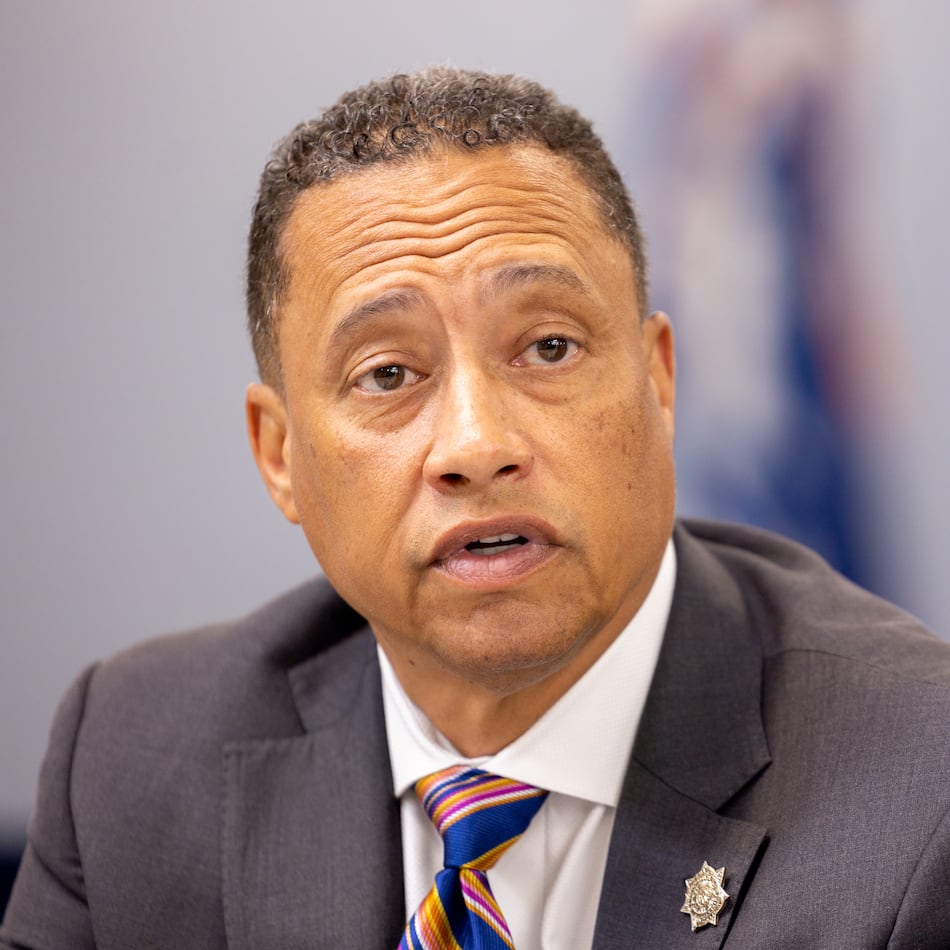A controversial plan to remove homeless people from downtown Atlanta before the 2026 FIFA World Cup could lead to some arrests “solely to make the city look nice,” according to a Fulton County judge.
Superior Court Judge Robert McBurney, who cochairs a justice board that seeks alternatives to incarceration in metro Atlanta, said he’s concerned the city’s plan to end homelessness in downtown and house hundreds of people by next summer could prompt encounters between police and unsheltered people, leading to arrests.
Any increase in the local jail population should concern “everyone in the criminal justice system,” because it would tax resources and expose people to an unhealthy, unsafe environment, McBurney told The Atlanta Journal-Constitution.
As Atlanta prepares for the World Cup and the international attention it will bring, the city’s sizable homeless population has emerged as a flashpoint. Some advocates worry that officials will turn to arrests to clear the streets, with some of the city’s homeless ending up in the troubled Fulton County Jail.
Partners for HOME, the nonprofit that implements the city of Atlanta’s homeless strategy, is leading the effort, known as “Downtown Rising.” The initiative is part of a $212 million campaign called “Atlanta Rising” to end unsheltered homelessness in the city.
Mayor Andre Dickens said at a news conference on summer safety on Wednesday that his administration has been working to make housing available since long before anyone knew Atlanta would be hosting World Cup matches.
He added that encampments under bridges are unsafe and won’t be tolerated.
“We want to make sure those unsheltered individuals don’t come anywhere downtown, and throughout the city of Atlanta, not just during the World Cup, but now,” he said.
Asked how the city will handle enforcement, Dickens said police would take people who violate city ordinances to the pre-arrest diversion center, which offers treatment and other services to people who are homeless or have substance use or mental health issues, allowing them to avoid arrest.
“If you break the law, we have measures to deal with that like any other lawbreaker,” Dickens added.
Not focused on arrests
Partners for HOME Chief Executive Cathryn Vassell said their plan calls for housing 400 people who are sleeping outdoors in downtown by the end of 2025 and offering them the services they need — not to arrest them if they don’t want what is offered.
Atlanta Police Maj. Jeff Cantin also said he doesn’t envision Downtown Rising resulting in arrests “unless there’s something really egregious.”
“We are not trying to prosecute people for being homeless,” said Cantin, who oversees the department’s Homeless Outreach Proactive Enforcement team, known as HOPE. “We’re trying to get them the help they need.”
But racial justice advocate Michael Collins objects to the involvement of entities like the Atlanta Downtown Improvement District and the Metro Atlanta Chamber in the Downtown Rising strategy.
“A bunch of downtown businesspeople have gotten together and decided that in order for the World Cup to be economically successful to them, they need to eradicate homelessness from the area, even if this means lots of low-income, Black and brown people end up going to the county jail — a death trap that has been deemed unconstitutional,” said Collins, senior director of the organization Color of Change.
In an investigative report, the U.S. Department of Justice found conditions at the Fulton County Jail “abhorrent” and “unconstitutional.” The report is replete with examples of how people have been harmed by the horrific conditions, rampant violence, indifferent supervision and poor medical care.
After the report was released, the DOJ and Fulton County reached a legally binding consent decree.
Marcus Mister, a vice president of the Atlanta Downtown Improvement District, said the organization added an outreach team in 2020 and is focused on helping refer homeless people to services. It also has an ambassador force supported by off-duty police officers.
Mister said the organization’s approach toward homeless people has gradually become more empathetic.
“That has really required some retraining of our ambassador force,” he said.
However, if homeless people resist efforts to close downtown to outdoor sleeping, he said, “Then it’s whatever ordinance is on the book to enforce.”
‘This is what I know’
Officials in Fulton County in recent weeks have complained publicly that police officers in the city of Atlanta and across Fulton County are taking too many people to jail on minor charges like trespassing, instead of bringing them to the new diversion center in downtown Atlanta.
McBurney said the diversion center could connect people to housing resources but that people can only stay there for up to 23 hours.
Credit: Miguel Martinez-Jimenez
Credit: Miguel Martinez-Jimenez
He added that any effort to relocate dozens of people — who consider their homes to be a tent on sidewalk in downtown — “can be the emotional trigger, the mental health trigger that causes them to do something that gets them locked up,” like taking a swing at an officer.
“If history is a guide, there would be a significant number of people who are not interested in moving,” he said.
Twenty-four people declined offers of permanent supportive housing and seven refused shelter during Downtown Rising’s first encampment closure, which took place last month on Pryor Street under the Interstate 20 overpass in downtown Atlanta, according to Vassel of Partners for HOME.
Another 49 people from the Pryor Street camp moved into housing, 27 moved into shelters, and 74 others were “referred to housing,” Vassell said.
Some relocated to the Cooper Street area in the nearby Mechanicsville neighborhood — where the city shut down a large encampment last year, Vassel said.
Officials said no one was arrested during the Pryor Street encampment’s closure.
“Most people who are declining (offers of housing) have very complex challenges, whether they’re severely mentally ill and can’t make a good decision for themselves or aren’t lucid enough,” Vassell said.
Credit: Jason Getz / Jason.Getz@ajc.com
Credit: Jason Getz / Jason.Getz@ajc.com
Chukey Carter, 42, said he was living at the Pryor Street camp for several months earlier this year. He said he ended up in Atlanta accidentally after he fell asleep on a bus on New Year’s Eve and missed his stop in Columbia, S.C.
He said he recently received an apartment with a one-year lease that doesn’t require him to pay rent or utilities.
But he said a lot of homeless people will refuse to leave downtown if the city tries to relocate them. They will say: “‘I’m going to still stay out here. This is what I know.’”
Credit: Jason Getz / Jason.Getz@ajc.com
Credit: Jason Getz / Jason.Getz@ajc.com
Mandy Chapman Semple, managing partner of Clutch Consulting, which is working with Partners for Home to develop the Downtown Rising plan, said it often takes several offers of housing and services to convince a homeless person to accept them because many are skeptical.
For those who don’t accept help, Chapman Semple said outreach workers will continue to encourage them to go to shelters.
A Partners for Home map shows several “outreach” zones, including at least 10 encampments near Mercedes-Benz Stadium, where the city will host eight World Cup matches, including a semifinal game on July 15, 2026.
“We are not going to a zone and closing it until we know we have sufficient housing to offer to everybody in that particular geography,” Vassell said.
Robb Pitts, chairman of the Fulton County Board of Commissioners, said he has not been briefed on the Downtown Rising plan but believes it is possible to house 400 people.
Providing homes to people sleeping near Mercedes-Benz Stadium, he said, would be “the best of all worlds.”
“But in the absence of that, I think they will probably be able to relocate them on a temporary basis,” Pitts said. “Now the question becomes: What happens after the World Cup if they come back to where they were?”
Staff writer Shaddi Abusaid contributed to this story.
About the Author
Keep Reading
The Latest
Featured




